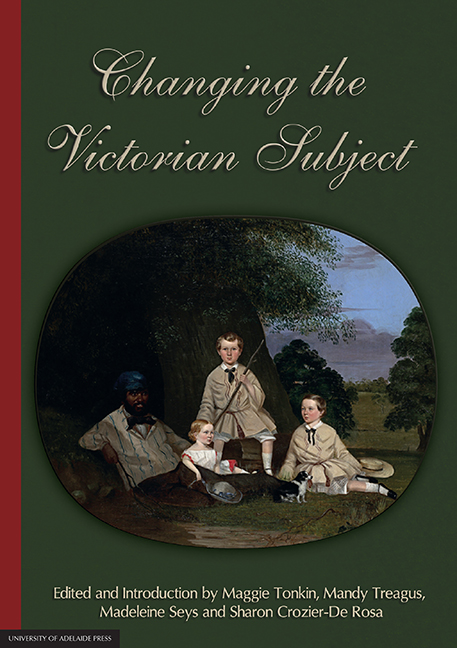Book contents
- Frontmatter
- Contents
- Notes on Contributors
- 1 Re-visiting the Victorian subject
- 2 Queen Victoria's Aboriginal subjects: a late colonial Australian case study
- 3 Identifying with the frontier: Federation New Woman, Nation and Empire
- 4 A ‘Tigress’ in the Paradise of Dissent: Kooroona critiques the foundational colonial story
- 5 The making of Barbara Baynton
- 6 A literary fortune
- 7 Olive Schreiner's From Man to Man and ‘the copy within’
- 8 Guy Boothby's ‘Bid for Fortune’: constructing an Anglo-Australian colonial identity for the fin-de-siècle London literary marketplace
- 9 The scenery and dresses of her dreams: reading and reflecting (on) the Victorian heroine in M.E. Braddon's The Doctor's Wife
- 10 The woman artist and narrative ends in late-Victorian writing
- 11 Miss Wade's torment: the perverse construction of same-sex desire in Little Dorrit
- 12 ‘All the world is blind’: unveiling same-sex desire in the poetry of Amy Levy
- 13 From ‘Peter Panic’ to proto-Modernism: the case of J.M. Barrie
1 - Re-visiting the Victorian subject
Published online by Cambridge University Press: 05 December 2014
- Frontmatter
- Contents
- Notes on Contributors
- 1 Re-visiting the Victorian subject
- 2 Queen Victoria's Aboriginal subjects: a late colonial Australian case study
- 3 Identifying with the frontier: Federation New Woman, Nation and Empire
- 4 A ‘Tigress’ in the Paradise of Dissent: Kooroona critiques the foundational colonial story
- 5 The making of Barbara Baynton
- 6 A literary fortune
- 7 Olive Schreiner's From Man to Man and ‘the copy within’
- 8 Guy Boothby's ‘Bid for Fortune’: constructing an Anglo-Australian colonial identity for the fin-de-siècle London literary marketplace
- 9 The scenery and dresses of her dreams: reading and reflecting (on) the Victorian heroine in M.E. Braddon's The Doctor's Wife
- 10 The woman artist and narrative ends in late-Victorian writing
- 11 Miss Wade's torment: the perverse construction of same-sex desire in Little Dorrit
- 12 ‘All the world is blind’: unveiling same-sex desire in the poetry of Amy Levy
- 13 From ‘Peter Panic’ to proto-Modernism: the case of J.M. Barrie
Summary
Critical Perspectives
In entitling this collection of essays Changing the Victorian Subject, we are not supposing that the Victorian subject has ever been singular or monolithic. Indeed, we take Martin Hewitt's caution against just such an assumption to be self-evident. In 2001 Hewitt wrote:
The denomination ‘Victorian’ continues to be widely used in the 1990s both denotatively and connotatively, but in ways which make no attempt to interrogate the nature of the ‘Victorian.’ Where the ‘Victorian’ is subject to direct critical enquiry, it is almost always as part of a conventional reading against the grain, in which some monolithic ‘Victorian’ identity is conjured only for the doubtful and unenlightening pleasure of deconstructing it. Taken to its logical conclusion, such a stance leaves Victorian Studies as a label of purely temporal convenience. (143)
As academics based in Australia but working within a field that goes by the name of a British sovereign, we are fully cognisant of the plurality of what might fall under the rubric ‘Victorian’. The imagined relationships of colonial subjects to a foreign monarch, and a foreign yet hegemonic culture, need always to be imagined in the plural. For colonial subjects, the ‘Victorian’, even taken as ‘a label of purely temporal convenience’, is fraught with complexity and nuance, since in the colonies that very epoch saw the emergence of discourses of nationhood and of anti-colonial rhetoric, alongside strident declarations of allegiance and conformity to metropolitan values.
- Type
- Chapter
- Information
- Changing the Victorian Subject , pp. 1 - 20Publisher: The University of Adelaide PressPrint publication year: 2014



